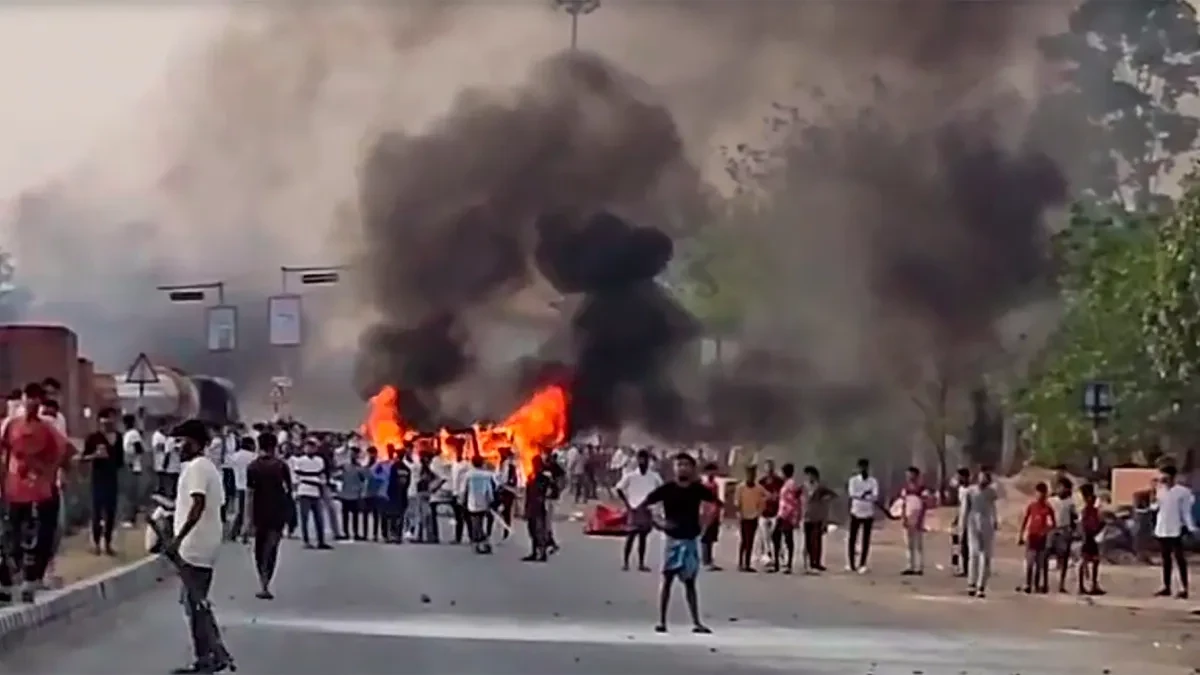Scenes of devastation were visible across several parts of Bengal’s violence-hit Murshidabad district on Sunday, as paramilitary personnel patrolled the largely deserted streets.
Following an order by the Calcutta High Court on Saturday, paramilitary forces were deployed in highly sensitive zones. The court stated it “cannot turn a blind eye to reports of vandalism in a few districts of West Bengal.”
Violence that erupted following Friday prayers continued into a second day, with police confirming on Saturday that at least three had lost their lives.
On Sunday, 12 people were detained during overnight raids, bringing the total number of arrests to 150. Authorities added that the situation in Suti, Dhulian, Samserganj, and Jangipur had stabilised.
While West Bengal’s Leader of the Opposition, Suvendu Adhikari, claimed that Hindus were “not safe” in the state, Chief Minister Mamata Banerjee urged for peace, alleging that “some political parties” were “trying to misuse religion for political gain.”
Key Pointers:
Suvendu Adhikari launched a scathing critique of Mamata Banerjee’s alleged appeasement politics, claiming it has emboldened “radical elements.” He further alleged that more than 400 Hindus were displaced from Murshidabad amid the unrest.
Posting on X, Adhikari wrote, “More than 400 Hindus from Dhulian, Murshidabad, driven by fear of religiously driven bigots were forced to flee across the river & take shelter at Par Lalpur High School, Deonapur-Sovapur GP, Baisnabnagar, Malda.”
Three days after the initial violence, prohibitory orders under section 163 of the Bharatiya Nagarik Suraksha Sanhita remain in place in affected zones, and internet services have been suspended to curb misinformation, local police confirmed.
On Saturday, West Bengal’s Director General of Police, Rajeev Kumar, issued a warning against spreading rumours, suggesting such actions were a key trigger for the outbreak of violence.
Police said further arrests are likely as investigations progress. Vehicle checks are ongoing on main roads, and patrols continue in sensitive regions.
In addition to nearly 300 Border Security Force (BSF) personnel already stationed locally, five more companies have been deployed upon the state government’s request.
Following the High Court’s directive, paramilitary units have been stationed in highly sensitive areas such as Suti and Shamsherganj. Personnel from central forces carried out overnight patrols in affected zones and also spoke with families of victims.
Sources indicated that West Bengal has assembled a team of 23 special officers from across the state and assigned them to violence-hit areas in Murshidabad, a district bordering Bangladesh, for the next four days.
Of the 23 deployed officers, ten hold the rank of Deputy Superintendent of Police (DSP), while the others are inspectors or sub-inspectors.
On Saturday night, top police official Rajeev Kumar entered Shamsherganj – one of the worst-affected areas – accompanied by senior officers and a sizeable security force.
Kumar also led a late-night route march through the area. During Saturday’s hearing, the Calcutta High Court noted the violence had spread beyond Murshidabad to districts like North 24 Parganas and Champdani in Hooghly.
Suvendu Adhikari has since demanded central forces be deployed in those districts as well. He claimed that at least 35 Hindu-owned shops in Dhulian were set ablaze during Friday’s unrest.
Another resident expressed his dismay at the lack of police intervention, saying, “There were no police officials. They were just scared. Sitting inside their houses like us.”
Among those killed were a father and son – Hargobind Das and Chandan Das – who were reportedly hacked to death by a mob on Saturday.
Another victim died from gunshot wounds. 17-year-old Izaz Ahmed Sheikh was struck by a bullet when police opened fire in Suti on Friday.
He was pronounced dead the following day. At least 18 police personnel have been injured since the protests against the newly enacted Waqf law descended into violence, with further incidents erupting on Saturday.
Welcoming the Calcutta High Court’s order to deploy paramilitary forces in Murshidabad, BJP state president and Union Minister Sukanta Majumdar blamed Chief Minister Mamata Banerjee’s “incompetence” and alleged appeasement tactics for the violence surrounding the Waqf Act.
“She is not eligible to rule the state… The police come under her control… Mamata Banerjee’s police are allowing free periods for Muslims. During that time, they can loot, misbehave with women, break the houses of Hindus and do whatever they want,” he was quoted as saying by ANI.Amit Vasudev Oneindia
